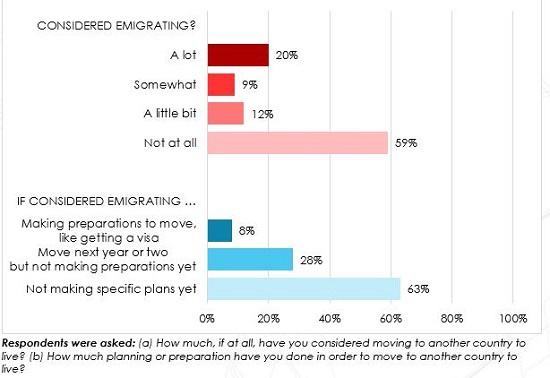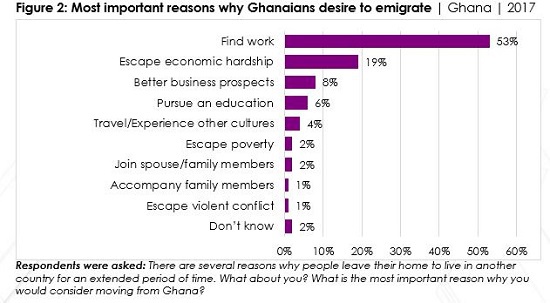Four in 10 Ghanaians have considered emigrating, although far fewer are actually taking steps to leave the country, a recent Afrobarometer survey indicates.
The study reveals that most potential emigrants are in search of more favourable economic prospects.
A majority would prefer to live outside Africa, with North America and Europe being the most preferred destinations.
The data is released as the world expresses outrage over reports of slavery and the inhuman treatment meted out to migrants in Libya.
Key findings
Four in 10 Ghanaians (41%) say they have considered emigrating, including 20% who say they have given “a lot” of thought to the idea (Figure 1). About three in 10 (29%) say they or someone in their household has gone to live in another country for more than three months during the past three years.
Of those who have considered emigrating, a few (8%) say they are taking concrete steps to emigrate, such as seeking a visa; 28% say they plan to leave within the next year or two but are not yet making concrete preparations, while 63% say they’ve considered emigrating but have not made specific plans yet.
Among those who have considered emigrating, a majority (53%) would want to move to find work. Others want to escape economic hardship (19%) or find better business prospects (8%) (Figure 2).
Among potential emigrants, the most popular destination is North America (39%), while 31% prefer living in Europe. Only 11% would want to live in other African countries (Figure 3).
Afrobarometer
Afrobarometer is a pan-African, non-partisan research network that conducts public attitude surveys on democracy, governance, economic conditions, and related issues across more than 35 countries in Africa. Six rounds of surveys were conducted between 1999 and 2015, and Round 7 surveys (2016/2018) are currently underway.
Afrobarometer conducts face-to-face interviews in the language of the respondent’s choice with nationally representative samples.
The Afrobarometer team in Ghana, led by the Ghana Center for Democratic Development (CDD-Ghana), interviewed 2,400 adult Ghanaians between September 9 and 25, 2017. A sample of this size yields results with a margin of error of +/-2% at a 95% confidence level. Previous surveys have been conducted in Ghana in 1999, 2002, 2005, 2008, 2012, and 2014.
Charts
Figure 1: Considering emigration | Ghana | 2017



General News of Tuesday, 12 December 2017
Source: Josephine Appiah-Nyamekye













